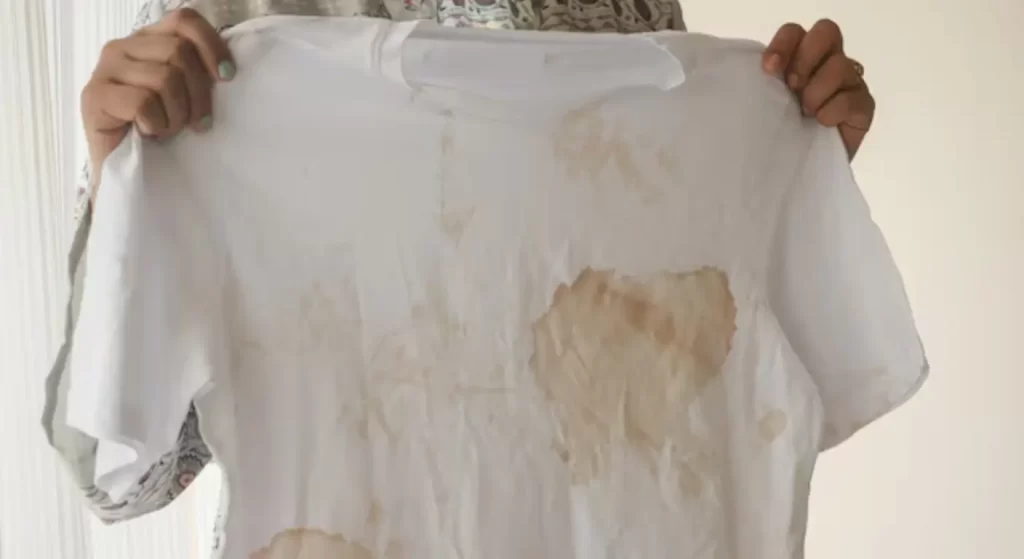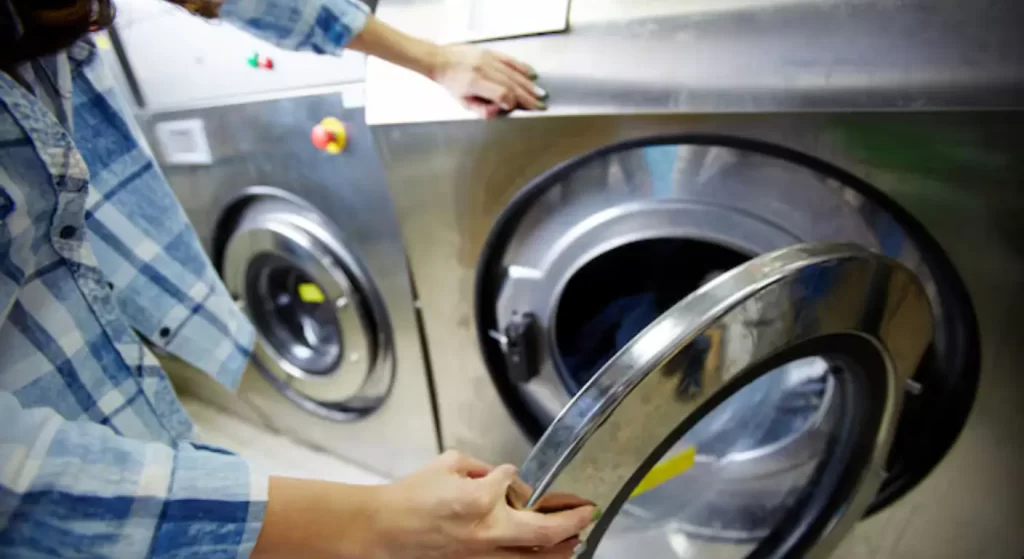What Are Hard Water Stains and How It Affect Your Laundry in Amsterdam

Washing clothes at home satisfies people who love to see the positive results by themselves. The reason is that some people don’t rely much on outsourcing their laundry to cleaners. However, there’s a concern that could damage their clothes, and that’s the hard water stains. That’s because hard water contains minerals like calcium and magnesium that damage outfits. If that’s the case, you can contact an expert like Love2Laundry to prevent hard water stains on your outfits.
We wash customers’ outfits with durable detergents and clean water, ensuring there won’t be residue buildup or clogs in the fabric. Our technique will remove hard water stains from your clothes and preserve their quality.
So, before moving towards the steps to prevent hard water damage, let’s understand what hard water really is.

Understanding Hard Water in Amsterdam
Hard water is water that contains minerals, such as calcium and magnesium, which are introduced when the water passes through limestone and chalk. It’s safe for regular use, but it can be harmful when used for washing outfits.
The reason hard water is common in Amsterdam is due to the groundwater source, as the water is filtered to remove calcium and limestone layers. Moreover, there are carbonate rocks that release calcium. So, that’s the reason why hard water stains appear on your clothes.
What Causes Hard Water in the Netherlands?
There are multiple reasons that cause hard water in the Netherlands, such as the supply in coastal areas. The water in these areas originates from dune-filtered surface water that contains minerals.
Furthermore, most of the cities in the Netherlands rely on groundwater sources that pass through mineral-rich layers. So, these are the reasons for hard water in Amsterdam, and require you to remove hard water stains when doing laundry.
Also Read – If you’re looking for a laundry service with 24/7 availability, choose a provider that offers laundry in Amsterdam with 24-hour delivery.
How to Know If Your Water Is Hard?
People often get confused when trying to identify signs that they’re using hard water in their daily routine. The fibres in their clothes become weaker, and the equipment shows visible signs of wear. So, here are the signs that’ll guide you about the hard water, and you might need a technique to clean hard water stains.
- Stiff, scratchy, or rough fabrics: The minerals in hard water, like calcium and magnesium, leave a residue that makes clothes feel stiff and uncomfortable.
- Dull or discoloured clothes: Mineral buildup can discolour white clothes, causing greying or yellowing, and fade coloured clothes. You may also see white or grey streaks on dark fabrics.
- Laundry that doesn’t feel clean: Hard water reduces laundry detergent’s effectiveness, hindering lather and cleaning, causing dirt buildup and a musty smell on clothes.
- Weakened fabric and increased wear and tear: The mineral deposits’ abrasive nature can cause fibres to break down faster, leading to tears and holes in clothes.
The Impact of Hard Water on Your Laundry
The impact of hard water on laundry presents multiple hurdles, resulting in permanent damage to clothing. If you’re also using hard water without knowing its effect, here are the points to consider. This way, you can prevent using hard water or use it with hard water cleaners.
- Makes the fabric dull and fades the colour.
- Stiffens the texture.
- Shortens the lifespan of outfits.
- Extra use of detergents and electricity.
Dull or Faded Fabrics
Water rich in minerals, such as calcium and magnesium, is considered hard water. These minerals cling to the fibres of fabrics, causing clothes to appear dull, faded, or aged. Bright colours tend to lose their luminosity, while whites often take on greyish or yellowish hues over time. It can be dealt with by a hard water cleaner to preserve the fabric quality.
Soap and Detergent Inefficiency
Soap and detergent do not dissolve easily in hard water. This means they produce more soap scum instead of providing cleaning action, which leaves clothes less fresh and, in some cases, with residue. A hard water cleaner might be needed to prevent damage to outfits.
Stiff Towels and Scratchy Clothes
Hard water minerals tend to be trapped within fabrics, especially in thick materials like towels. This makes them feel stiff and scratchy, as well as absorb far less water compared to when washed.
Build-Up in Washing Machines
The same mineral deposits that affect clothes can accumulate inside your washing machine. Thus, it reduces efficiency, increasing energy consumption, and sometimes damaging the machine itself.
Simple Tests to Check Hard Water at Home
You may be unaware of this unique technique, but you can test the hardness of the water at home before washing clothes. It’ll prevent the risk of stiff outfits, colour-fading, and stubborn hard water stains. Here’s how you can do it.
Soap Test: Take a small amount of liquid soap and mix it with water in a clear bottle. If it does not form much foam and appears cloudy, your water must be hard.
Look For Faucets/Appliances: All white and chalky depositions around taps or inside the kettle indicate that hard water is present.
Laundry Signs: Clothes that feel rough or have colours that fade quickly may also indicate hard water.
Also Read – If you’re opting for a natural cleaner like baking soda for delicate outfits, our blog on how to use baking soda for laundry will help you.
How to Protect Your Laundry from Hard Water Damage
Everyone knows that hard water is not suitable for washing clothes as it damages outfits in multiple ways. However, if hard water is your only option, here are some tips to help prevent the harmful effects.

Choose the Right Detergent
Use detergents that work for hard water. These are usually marketed as “high-efficiency” or “suitable for hard water,” and they break down minerals much better. So, always remember to check your detergent compatibility when washing clothes with hard water.
Use Fabric Softeners Wisely
A quality fabric softener can help make clothes less stiff. Underuse it, for excess applications can cause residue build-up on fabrics. If you don’t have fabric softener, you can use a hard water softener for laundry instead.
Add Natural Boosters
Add some vinegar or baking soda to the wash. This neutralises minerals, softens clothes, and fights detergent residue.
Maintain Your Washing Machine
Perform a clean cycle every month using vinegar or a descaling agent to remove mineral buildup and keep your machine in optimal condition. The instructions for simple washing machine maintenance will prevent hurdles from your laundry routine.
Also Read – If you’re confused whether to use liquid or powdered laundry detergent, our blog on powder vs. liquid laundry detergent will help you.
Professional Laundry Solutions in Amsterdam
If you’re still having trouble washing your clothes with hard water, consider contacting a professional like Love2Laundry to remove hard water stains. The reason is that we use cleaning supplies and techniques suitable for the job.
We guarantee a satisfactory result by making your clothes spotless, along with our convenient pickup & delivery service, as well as cost-effective laundry prices. This way, you can manage your routine without hurdles.

Why Professional Cleaning Works Better in Hard Water Areas
Laundry services utilise professional detergents and water treatments specifically designed for addressing hard water issues. When your clothes come back from such a service, they are cleaner, softer, and last longer than when cleaned at home.
How Love2Laundry Saves Time and Protects Your Clothes
With pickup and delivery options, Love2Laundry saves you from the hassle of doing laundry at home with hard water. Their cleaning process protects fabrics, keeps colours vibrant, and allows your clothes to be fresh and comfortable to wear.
FAQs – What Is Hard Water
What is meant by hard water?
Hard water is water that contains higher levels of minerals, such as calcium and magnesium. It’s safe for everyday use, but can cause damage if used for cleaning outfits. It gets tough for detergents to dissolve properly and leave residues behind.
How to fix hard water in laundry?
There are multiple ways to address hard water issues when doing laundry, such as using a water softener or using a hard water cleaner. Moreover, you can increase the amount of hard water laundry detergent specifically for hard water to prevent the damage caused by minerals.
What laundry detergent is best for hard water?
When using hard water, the best detergents to use are the liquid ones, as they leave less residue than powdered laundry detergents. You can check the detergents with high efficiency or those suitable for hard water mentioned on the label at the time of purchase. There won’t be hard water stains on your outfits with liquid detergents.
Wrap Up!
Now that you know what hard water stains can do to your clothes, it would be better to opt for a durable hard water laundry detergent. If you follow the guide for washing clothes with hard water, there won’t be any risk.
Moreover, using a hard water cleaner while doing laundry helps mitigate the effects of hard water by reducing the residue that it leaves behind. If you experience trouble using hard water, the laundry services in Amsterdam can assist you.


